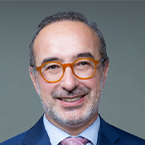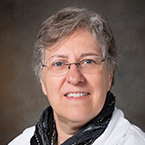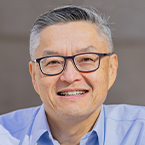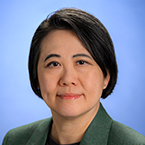Speaker Biographies

Michael A. Caligiuri, MD, (pronounced KALAJURY) recently completed his five-year term as President of the City of Hope National Medical Center in Los Angeles, California where he held the Deana and Steve Campbell Physician-in-Chief Distinguished Chair. He continues to oversee his research laboratory at City of Hope as a professor in the Department of Hematology and Hematopoietic Cell Transplantation. Prior to his appointment at City of Hope in February of 2018, Dr. Caligiuri was The CEO of The Ohio State University (OSU) James Cancer Hospital (2008-2017) and Director of OSU’s Comprehensive Cancer Center (CCC; 2003-2017); he served as the Director of OSU’s Division of Hematology-Oncology from 2000 through 2008. While CCC Director and hospital CEO, Dr. Caligiuri oversaw the construction of the 3rd largest cancer hospital in the United States and recruited over 300 physicians and scientists to OSU. Dr. Caligiuri is a physician – scientist whose basic and translational work has focused on immunotherapy for both liquid and solid tumors. His laboratory has studied human natural killer (NK) cells for 35 years with over 420 original peer-reviewed publications on NK cells and/or cancer. Pivotal discoveries from the Caligiuri laboratory have made it possible to bring chimeric antigen receptor (CAR) NK cells from the laboratory into the clinic for cancer therapy. These include proprietary retroviral transduction of human NK cells, the elucidation of the site, stages, cytokines and molecular mechanisms involved in the differentiation of human NK cells from CD34(+) hematopoietic stem cells, and the discovery of IL-15 as the key cytokine for human NK cell development, survival, growth, and activation. These three advances have been critical for the genesis of CAR NK cells from peripheral blood, umbilical cord blood and induced pluripotent stem cells (iPSCs). Most all of this work was accomplished with his trainees as well as his longtime collaborator, Jianhua Yu, PhD. In 2024, his lifetime ranking was 4th in the world within the discipline of natural killer cell biology by ScholarGPS® Dr. Caligiuri has designed and conducted clinical studies modulating NK cells for over 1,000 patients with cancer. Over 150 students have trained in the Caligiuri laboratory and have received over 225 local, state, national or international awards for their research. In 2022 Dr. Caligiuri received the Basic Science Mentor Award from the American Society of Hematology. Dr. Caligiuri is an elected member of the American Association for Clinical Investigation and the American Association of Physicians, and he is an elected Fellow of the American Association for the Advancement of Science (AAAS). He is past president of the Association for American Cancer Institutes; past president of the Society of Natural Immunity, and most recently served as president of the American Association for Cancer Research (AACR), the world’s largest cancer research organization. Dr. Caligiuri has served on the National Cancer Institute (NCI) Board of Scientific Counselors and Board of Scientific Advisors; he was chairman of the Institute of Medicine’s National Cancer Policy Forum from 2014-2016. In 2010, Dr. Caligiuri was one of four individuals in the country to receive a MERIT award from the National Cancer Institute for his work on immunity and cancer, and in 2016 he received an Outstanding Investigator Award from the National Cancer Institute. In 2018, Dr. Caligiuri received the lifetime achievement award from Stanford University School of Medicine, was elected a Fellow of the AACR Academy and a member of the USA National Academy of Medicine. Dr. Caligiuri is co-founder of Pelotonia (www.pelotonia.org), The Oncology Research Information Exchange Network (www.ORIENcancer.org), CancerBridge (www.mycancerbridge.com), The Ohio State University Drug Development Institute (https://cancer.osu.edu/research-and-education/drugdevelopment-institute), and CytoImmune Therapeutics (www.cytoImmune.com). Dr. Caligiuri earned his undergraduate degree from the State University of New York at Buffalo, his masters and medical degrees from Stanford University School of Medicine. He completed his internship and residency in Internal Medicine at Brigham and Women’s Hospital at Harvard Medical School in Boston, MA, then completed a fellowship in medical oncology, bone marrow transplantation and immunology at the Dana-Farber Cancer Institute at Harvard Medical School. He next spent seven years at Roswell Park Cancer Institute as an assistant, associate, and full professor before moving to The Ohio State University in 1997, and City of Hope in 2018.
Published Work: https://www.ncbi.nlm.nih.gov/pubmed/?term=caligiuri+ma

Dr. Flaherty is Director of Clinical Research at the Massachusetts General Hospital Cancer Center, and Professor of Medicine at Harvard Medical School. As described in the more than 300 peer reviewed primary research reports he has authored or co-authored, Dr. Flaherty and colleagues made several seminal observations that have defined the treatment of melanoma when they established the efficacy of BRAF, MEK and combined BRAF/MEK inhibition in patients with metastatic melanoma in a series of New England Journal of Medicine articles for which Dr. Flaherty was the first or senior author. He was the principal investigator of the NCI MATCH trial, the first NCI-sponsored trial assigning patients to targeted therapy independent of tumor type on the basis of DNA sequencing detection of oncogenes. Dr. Flaherty joined the NCI Board of Scientific Advisors in 2018 (chair 2021-23), AACR Board of Directors in 2019, and was elected president of AACR in 2025. Dr. Flaherty co-founded Loxo Oncology in 2013 and Scorpion Therapeutics in 2020, serving on the board of directors through the acquisitions of both by Eli Lilly in 2019 and 2025. He co-founded X4 Pharmaceuticals (NASDAQ: XFOR), privately held Strata Oncology (2015), Apricity Oncology (2017), Gyges Oncology (2020), Khora Therapeutics (2024), and Monimoi Therapeutics (2025). He has served on the boards of directors for Clovis Oncology, Kinnate BioPharma, and Checkmate Pharmaceuticals (until its acquisition by Regeneron in 2022), along with Loxo Oncology, Strata Oncology and Scorpion Therapeutics.

Manuel Hidalgo, MD, PhD is a Professor of Medicine and Clinical Director of the Gastrointestinal Cancer Center at New York University. Dr. Hidalgo received his MD degree from the University of Navarra in Pamplona, SPain and a PhD degree from University Autonoma of Madrid. He trained in medicine and medical oncology at Hospital ¨12 de Octubre¨ in Madrid, Spain and at the University of Texas Health Science Center in San Antonio where he completed a fellowship program in anticancer drug development. He is a member of the board of directors of Bristol Myers Squibb and Guardant Health and also serves as a board member of the American Association for Cancer Research. His main focus of research is in drug development and pancreatic cancer. His group popularized the used of Avatar mouse models for cancer research and has contributed to the development multiple new anticancer agents.

Christine Hodgdon is living with metastatic breast cancer and is the co-founder of GRASP – Guiding Researchers & Advocates to Scientific Partnerships, which connects patients, clinicians, and researchers to advance patient-informed science. GRASP is currently collaborating with the U.S. Food & Drug Administration’s Oncology Center of Excellence to co-host an advanced workshop on drug development and clinical trial design for patient advocates. Christine also spearheads the Metastatic Breast Cancer Alliance-sponsored Breast Cancer Brain Metastasis Initiative, serves as an advocate representative to the Translational Breast Cancer Research Consortium (TBCRC), and co-founded and co-leads the INSPIRE Research Advocacy Program at Johns Hopkins, where she is also a patient.

Dr. Patricia LoRusso has been a practicing academic medical oncologist performing clinical/translational research in early phase clinical trials for 35 years, spending the first 25 years at Wayne State University/Karmanos Cancer Institute in Detroit, MI and transitioning to Yale University/Yale Cancer Center in 2014. She has had continuous NIH/NCI peer review funding for 33 years, having held a U-grant for early phase clinical trials through the NCI Cancer Therapy Evaluation Program (CTEP) for 28 years. She has also collaborated on numerous other grants and has been an investigator for R01, P01, and P30 funding mechanisms. Understanding the need for team science, she has participated in P50 mechanisms and has been awarded team science grants through such organizations as Stand Up to Cancer (Co-Leader: Melanoma Dream Team), the Department of Defense (DOD), and the Komen Foundation (Co-leader, KG111063:Targeting Stem Cells in Triple-Negative Breast Cancer (TNBC) in Different Racial Populations).
Dr. LoRusso has also been involved in many service disciplines at the NCI and elsewhere. She has reviewed grants for many study sections and has either been an ad hoc (e.g. CCSG, NeXT study sections) or permanent study section member (e.g. Program Project Subcommittee D and Clinical Oncology study sections). She has served on the Investigational Drug Steering Committee (IDSC) since inception (2005-present) and served as its chair from 2011-2013 and 2022-2024. She was a member of the steering committee that convened after the Blue- Ribbon Panel to execute on their recommendations. She served a 9-year term (2015-2024) on the Board of Scientific Council (BSC), reviewing intramural programs for quality, content, productivity and funding.
In addition to serving in NCI positions, Dr. LoRusso has served in leadership positions of several other organizations. She has served on the Board of Directors and numerous scientific and education committees of the American Association for Cancer Research (AACR), and was the AACR president from 2024-2025. She is currently the immediate past-president of AACR. She has served on education and scientific committees of the American Society of Clinical Oncology (ASCO) and the steering committee for the Food and Drug Administration (FDA) Accelerating Anticancer Agent Development and Validation Workshop, as examples. Internationally, she has taught several clinical trials educational workshops, educating many physicians and scientists across the globe. She understands how critically important it is to train the next generation of early career investigators to be knowledgeable and proficient in clinical and translational research by providing them with leadership opportunities and mentoring. She has worked closely with Cancer Research United Kingdom (CRUK), a UK Welcome Trust which is the second largest funding agency for cancer research. She is currently the chair of their New Agents Committee (NAC), reviewing international proposals related to drug development of novel agents.
Working closely over the past three decades with patients suffering from advanced malignancies, Dr. LoRusso has become an advocate, not only for junior through senior faculty cancer researchers and clinicians, but more importantly for the patients and their caregivers. Having experienced at a young age the death of her own parents from cancer, she understands the urgent need for new cancer discoveries and the potential for longevity and quality of life. She is committed to training the next generation of physician scientists and clinical researchers, to advance novel therapies to increase outreach of novel therapeutics to cancer patients globally.

William Pao is a physician-scientist whose career has spanned academia, industry, and biotech. William is currently CEO and a co-founder of Revelio Therapeutics, a biotech advancing novel tumor-specific biologics for the treatment of cancer. Previously in industry, in executive leadership positions at Roche and Pfizer, he oversaw the discovery and development of a portfolio of new molecular entities, many of which have been approved, to treat a variety of diseases. As Chief Development Officer and Executive Vice President at Pfizer, he was a member of the Executive Leadership Team and led the Global Product Development organization, which was responsible for the clinical development and advancement of Pfizer’s pipeline of innovative medicines in inflammation and immunology, internal medicine, hospital, oncology, rare disease, and vaccines, as well as regulatory affairs in support of Pfizer’s R&D pipeline and portfolio of marketed medicines and vaccines. Under William’s leadership, Pfizer achieved 13 approvals in the US and EU. As Head of the Roche Pharma Research & Early Development (pRED) unit based in Basel Switzerland, he was a member of Roche’s Enlarged Corporate Executive Committee and oversaw the discovery and early development of a portfolio of new molecular entities to treat diseases related to cancer, neuroscience, ophthalmology, rare diseases, immunology, infectious diseases, and rare blood disorders, across seven global sites. At pRED, he also served as the Global Head of the Oncology Discovery and Translational Area. Under William’s leadership, pRED contributed to the development of at least 10 approved molecules. In academia, William was a practicing oncologist, lab researcher and clinical investigator at Memorial Sloan-Kettering Cancer Center and then Vanderbilt University, where he also served as the Director of the Division of Hematology/Oncology. He was recognized for his ground-breaking work in translational medicine, mechanistic and clinical studies of targeted cancer therapeutics, cancer genomics, and personalized medicine, changing the standard of care in lung cancer. He is particularly recognized for his work characterizing mechanisms of sensitivity and resistance to EGFR inhibitors in lung cancer, and his laboratory helped develop the combination of afatinib/cetuximab as well osimertinib to treat EGFR-mutant lung cancer. He currently is an Adjunct Professor of Medicine at Vanderbilt and Weill Cornell School of Medicine. William obtained his MD and PhD degrees at Yale University, did his housestaff training in Internal Medicine at New York Presbyterian Hospital-Weill Cornell Campus, and completed his medical oncology fellowship training at MSKCC. He was inducted into the American Society for Clinical Investigation in 2011 and the Association of American Physicians in 2017. He co-founded MyCancerGenome, an internationally-recognized online tool to enable a genetically-informed approach to cancer medicine and has a patent on the EGFR T790M mutation. In addition to serving as an Independent Board Member for Alentis Therapeutics and Obsidian Therapeutics, he serves on the Board of Visitors of the Vanderbilt School of Medicine Basic Sciences and the Board of Directors for the American Association for Cancer Research. He is author of the book, Breakthrough: The Quest for Life-Changing Medicines.

Katerina Politi studied Biology at the University of Pavia in Italy. She then moved to New York, where she obtained her PhD in Genetics and Development working with Argiris Efstratiadis at Columbia University. Following graduate school, she joined Harold Varmus’ lab at the Memorial Sloan-Kettering Cancer Center and began her work on the molecular basis of lung cancer. She continues this work at Yale as the Joseph A. and Lucille K. Madri Professor of Pathology and Internal Medicine (in the Section of Medical Oncology). Her laboratory is focused on studying the biology of lung cancer and on uncovering mechanisms of resistance to targeted therapies and immunotherapies in this disease. At the Yale Cancer Center, Dr. Politi is a co-leader of the Cancer Signaling Networks Research Program, the co-director of the Yale SPORE in Lung Cancer, and the co-director of the Center for Thoracic Cancers.

Dr. Jorge S. Reis-Filho leads Data Science and AI across AstraZeneca Oncology Research and Development, primarily focusing on the development and deployment of multimodal foundation models, advanced data science approaches, and agentic AI frameworks to drive innovation throughout AstraZeneca’s oncology pipeline and portfolio. Through the integration of rigorously validated AI-driven approaches across R&D, AstraZeneca aims to accelerate drug discovery and transform clinical development to advance its bold ambition in oncology: eliminating cancer as a cause of death. Dr. Reis-Filho earned a joint MD from the University of Porto, Portugal, and the Universidade Federal do Paraná, Brazil; completed histopathology training at the University of Porto; and obtained a PhD in breast cancer molecular pathology from the Institute of Cancer Research and the Royal Marsden Hospital in London, where he rose to Team Leader and subsequently Professor and Chair of Molecular Pathology. In 2012, he joined Memorial Sloan Kettering Cancer Center in New York, becoming Chief of Experimental Pathology and Director of the Experimental Pathology Fellowship Program in 2016. Author of more than 700 peer-reviewed papers, Dr. Reis-Filho has defined molecular taxonomies for rare tumours, created a predictive classification of breast cancer, elucidated the causes and consequences of intra-tumour genetic heterogeneity, and pioneered technologies ranging from single-cell DNA sequencing of archival tissue to FDA-cleared computational pathology diagnostics. His contributions to the field have been recognised by multiple awards, including the USCAP Ramzi Cotran Young Investigator Award (2010), the CRUK Future Leaders Prize (2010), the Goudie Medal and Lectureship (2023), the BCRF Larry Norton Award (2023), and the MSKCC William Gerald Award (2024). He is also the youngest individual ever elected as a Fellow of the Royal College of Pathologists based on published works. Prior to joining AstraZeneca, Dr. Reis-Filho consulted for Goldman Sachs Merchant Banking and Bain Capital, in addition to serving on the boards of directors and scientific advisory boards for several biotechnology companies, guiding strategy across precision medicine and artificial intelligence.

Yu Shyr received his PhD in biostatistics from the University of Michigan in 1994 and subsequently joined the faculty at Vanderbilt University School of Medicine, where he won the Hawiger Award for Excellence in Teaching in 2012 and was inducted into the Academy for Excellence in Education in 2013. Renowned for his development of integrative methods and high-impact applications of those methods, Shyr is an elected fellow of the American Statistical Association (ASA), the American Association for the Advancement of Science (AAAS), and the American Association for Cancer Research (AACR), and he holds an honorary doctorate from National Cheng Kung University. He has published more than 565 peer-reviewed papers (h-index = 129) and serves as an associate editor for JAMA Oncology and Journal of Thoracic Oncology. Shyr has presented more than 280 invited talks, workshops, and courses around the world and currently co-directs the BMSF-AACR Design and Implementation of Clinical Trials Workshop, part of the Robert A. Winn Excellence in Clinical Trials Award Program established by the Bristol Myers Squibb Foundation.
In demand as an expert on external advisory boards and data safety monitoring committees across the United States, Shyr was a voting member of the US Food and Drug Administration (FDA) Anti-Infective Drugs Advisory Committee and has served on dozens of National Cancer Institute (NCI) study sections and panels. As principal investigator of the Barrett’s Esophagus Translational Research Network Coordinating Center (BETRNetCC), funded by an NCI U24 grant, Shyr led a team that provided crucial support for the collection, management, analysis, and dissemination of data among multiple research centers. His current projects include developing novel statistical and bioinformatic tools for biomedical research and improving experiment and clinical trial design, particularly in the areas of proteomics and genomics, with special focus on RNA sequencing.

Dr. Siu is a senior medical oncologist at Princess Margaret Cancer Centre and a Professor of Medicine at the University of Toronto. She is the Director of the Phase I Trials Program, co-leads the Tumor Immunotherapy Program, and holds the BMO Chair in Precision Genomics. Dr. Siu has served on the Board of Directors of both the American Society of Clinical Oncology (ASCO) and the American Association for Cancer Research (AACR). She is a fellow of ASCO, AACR, and the Canadian Academy of Health Sciences (CAHS). Dr. Siu is the 2025-2026 President of the AACR. Dr. Siu’s major research focus is on new anticancer drug development, particularly in phase I trials and head and neck malignancies. Her translational research focus is on liquid biopsies, predictive biomarkers, and precision medicine. Internationally, Dr. Siu was the recipient of the US National Cancer Institute’s Michaele C. Christian Award in 2010, European Society of Medical Oncology’s Targeted Anticancer Therapies (TAT) Honorary Award in 2020, Canadian Cancer Trials Group’s Maria Ricci Memorial Lectureship in 2023, and ASCO’s highest honor – the David A. Karnofsky Memorial Award in 2024. Dr. Siu received the 2024 Lifetime Achievement Award from the Chinese American Hematologist and Oncologist Network (CAHON). For her mentorship of early career investigators, Dr. Siu received the International Women Who Conquer Cancer Mentorship Award from ASCO in 2020. Dr. Siu has published nearly 400 peer-reviewed manuscripts, and she is the co-editor-in-chief of AACR journal Cancer Research Communications and is on the editorial board for Cell and Cancer Cell.

Dr. Stewart is a Professor in the Department of Cell Biology and Physiology and Medicine at Washington University in St. Louis and is the Associate Director for Basic Science at the Siteman Cancer Center. She received her PhD in Microbiology and Immunology from UCLA in 1997 and completed her postdoctoral fellowship in Cancer Biology at the Whitehead Institute at MIT in Robert Weinberg’s laboratory. Dr. Stewart is an American Cancer Society Scholar, and her research is focused on understanding how age-related changes in the tumor microenvironment impact tumorigenesis. Her laboratory has shown that senescent stromal cells, similar to cancer associated fibroblasts, express a plethora of pro-tumorigenic factors, many of which are subject to post-transcriptional stabilization. This work led to the identification to the p38MAPK-MK2 pathway where Dr. Stewart and colleagues are targeting MK2 in a metastatic breast cancer trial. Dr. Stewart’s team is also using this knowledge to combine MK2 inhibition with immune therapy approaches to reduce metastatic breast cancer progression. Her group is also engaged in exploring the role senescent cells play in chemotherapy-induced comorbidities. Finally, the laboratory is also examining how age-related changes in the premetastatic niche facilitate tumor cell seeding and outgrowth and how these changes alter the local immune response to facilitate tumor cell proliferation and impact tumor cell dormancy.
